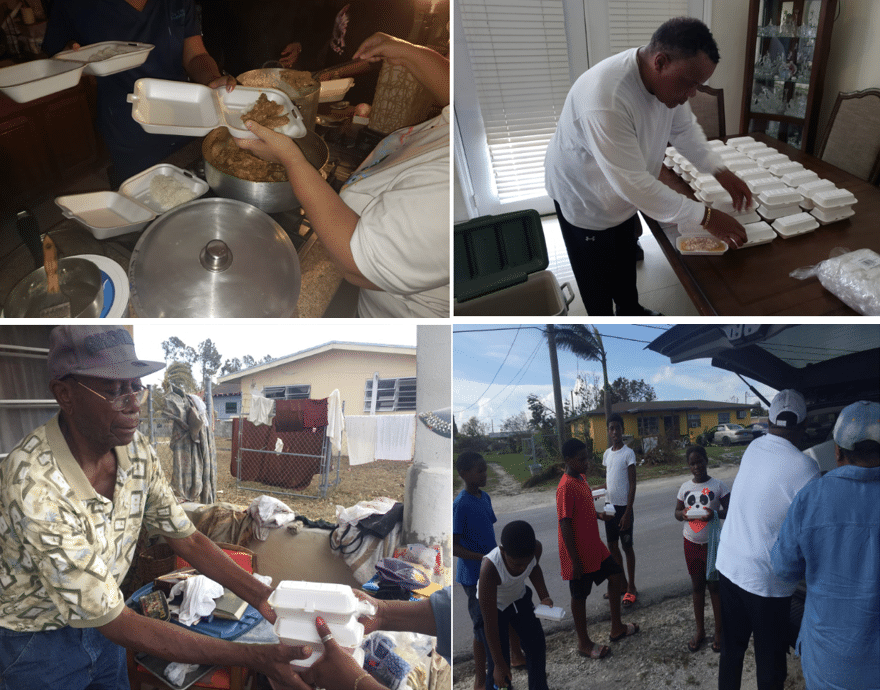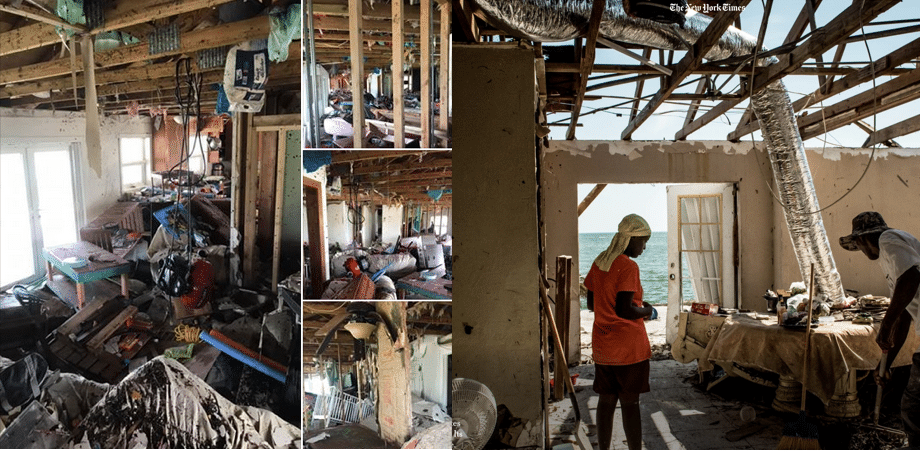If you haven’t already read my previous commentaries below, it might be helpful to do so before proceeding. Many donors found the most recent one (dated September 6) heartwarming and encouraging. Most notably, it features a video of my brother (the bishop) and sister (the master chef) preparing meals for displaced residents.
Donations in Action
The distribution of emergency supplies of food, water and medicine has been mostly coordinated by an ad hoc network of volunteers from Bahamian and American nonprofit groups.
(The New York Times, September 7, 2019)
 As I explained in my September 6 commentary, we are among that ad hoc network of volunteers. Our leader is my indomitable niece, Dr. Tammy Moss. And we are focusing our relief efforts on providing daily hot meals and basic medical care, which we expect to be doing for the foreseeable future.
As I explained in my September 6 commentary, we are among that ad hoc network of volunteers. Our leader is my indomitable niece, Dr. Tammy Moss. And we are focusing our relief efforts on providing daily hot meals and basic medical care, which we expect to be doing for the foreseeable future.
According to a September 10 Reuters report, the UN World Food Programme estimates that “some 70,000” residents are in need of food aid – the vast majority of whom are on our island of Grand Bahama. Unfortunately, according to a September 10 CNN report, Bahamian government officials have been (and still are) AWOL at the scene of many relief and recovery efforts. Bahamians at home and abroad are heaping unbridled criticisms on them. I prefer not to …
But there’s no denying that
- Dorian’s myriad forces stripped many of us of our individual pride;
- Our government’s myriad failures stripped all of us of our national pride.
I began volunteering with SOME over 20 years ago. It is an interfaith organization that provides basic aid to poor and homeless people in Washington, DC. My experience with SOME informed my approach to helping Bahamians who now find themselves facing years of poverty and homelessness.
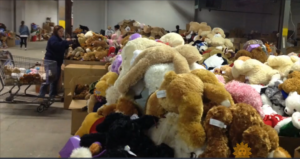 With full stomachs, they will be not only spared the indignity of having to beg for food but also nourished enough to fully participate in clearing out and repairing or rebuilding their homes. Truth be told, I also thought this was the best way to avoid having any hand in perpetuating this disaster phenomenon:
With full stomachs, they will be not only spared the indignity of having to beg for food but also nourished enough to fully participate in clearing out and repairing or rebuilding their homes. Truth be told, I also thought this was the best way to avoid having any hand in perpetuating this disaster phenomenon:
Many of the items we Americans donate in times of disaster turn out to be of no use to those in need. Sometimes, they even get in the way of humanitarian workers doing their job under difficult circumstances. Scott Simon of NPR reports on the useless, often incomprehensible contributions that constitute what aid workers call ‘the second disaster.’
(CBS News, April 24, 2016)
Alas, I fear many of the items people send to The Bahamas will end up in landfills along with debris from homes Dorian destroyed (e.g., winter coats too warm to wear and tons of unrefrigerated eggs too spoiled to eat).
Free Gas…?
The bishop remarked on Sunday that, while many people are donating supplies of all kinds, few are donating cash. Consequently, he and others are depleting what little savings they have to rebuild their own lives to buy gas to deliver food and medical care to others.
The spectre of gas companies gouging customers too often attends natural disasters. And you’d be forgiven for thinking that’s what they’re doing in hurricane-ravaged Freeport. But my siblings assure me that’s not the case. Gas stations are charging the usual high price of $5.65 per gallon.
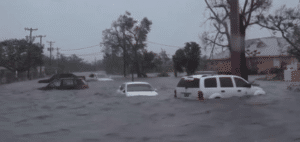 Except that, in times like these, leaders should be vested with emergency powers to, among other things, require gas stations to provide free gas for a specified period. Imagine the relief if the prime minister of the Bahamas had issued an executive order to this effect in Dorian’s wake.
Except that, in times like these, leaders should be vested with emergency powers to, among other things, require gas stations to provide free gas for a specified period. Imagine the relief if the prime minister of the Bahamas had issued an executive order to this effect in Dorian’s wake.
Never mind that, just as other businesses rushed to donate supplies, gas companies could/should have done the same. As things stand, in addition to delivering food to fuel the bodies of those trying to rebuild their lives, we are providing cash to fuel the cars relief workers are using to make those deliveries.
Meanwhile, many people have dried out and cleaned up their cars. But anyone who knows anything about the damage flooding causes knows they are driving them on borrowed time. As it is, they are already experiencing everything from malfunctioning electronics to putt-putting engines. But, like our friends down in Cuba, most Bahamians now have no choice but to drive their damaged cars way beyond their junk-yard date.
Repairing and Rebuilding
On a more positive note, people all over Abaco and Grand Bahama are displaying our independence, resilience and determination.
From dawn to dusk, many are using bare hands to clear the rubble Dorian made of all their worldly possessions, making clear their intent to repair and refurnish or completely rebuild their homes come what may. Some have even taken their hands-on approach to pitching tents in their backyards, which has the fringe benefit of making room in shelters for weaker and more affected compatriots. But woe betide these tent-dwelling souls; after all, this hurricane season has months to go and rebuilding could take years.
In any event, this means that, in addition to delivering food to shelters (no pictures allowed), we are making countless deliveries all over the island, twice a day. This explains the use and importance of gas.
Fleeing Abaco
You might fairly wonder why it appears so many could not wait to flee Abaco. The simple reason is that the vast majority of them are Haitian immigrants. More to the point, they lived in ramshackle homes in an area called, tellingly enough, The Mudd, and clearly had no ancestral or sentimental attachment to the island.
Therefore, one can hardly blame them for being first in line to evacuate. This, especially given the prospect of government support to resettle in areas with more infrastructure and public services, notably Nassau and even Miami.
 Unfortunately, the United States denied entry to a number of them without explanation; that is, until President Trump offered this heartless and ignorant slander:
Unfortunately, the United States denied entry to a number of them without explanation; that is, until President Trump offered this heartless and ignorant slander:
I don’t want to allow people that weren’t supposed to be in the Bahamas to come into the United States — including some very bad people and very bad gang members.
(The Washington Post, September 9, 2019)
Trust me, these poor folks are more Carmelite monks than criminal thugs. But Trump’s racist xenophobia is no respecter of differences among non-white-immigrant groups. Indeed, he was also wrong when he infamously slandered most Mexican migrants in similar fashion.
Celebrity Donors
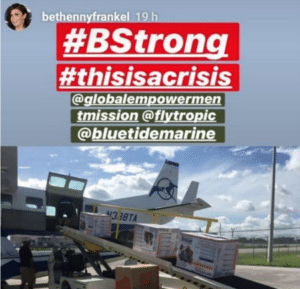 No doubt you’ve seen celebrities of all stripes making quite a show of their efforts to help. But it speaks volumes that no less a media organization than the BBC saw fit to report on those of reality-TV star Bethenny Frankel:
No doubt you’ve seen celebrities of all stripes making quite a show of their efforts to help. But it speaks volumes that no less a media organization than the BBC saw fit to report on those of reality-TV star Bethenny Frankel:
She told CNBC her organisation has raised more than $750,000 so far. ‘We have a warehouse on the ground, collecting the nations relief to be distributed by barges. Today we have four flights… they are planes with former navy seals, they are equipped with medical care,’ she said.
(BBC, September 6, 2019)
A friend asked how I felt about celebrities commanding so much attention and getting so many “Likes.” This, while my family and other locals are doing the grunt work in relative obscurity.
I hastened to say that I’d be the first to pin medals of national commendation on the lapels of those celebrities. Because there’s no gainsaying that they are mobilizing millions to support relief efforts. I cannot exaggerate or overstate how truly grateful we Bahamians are to them and all who are heeding their clarion calls.
 Mind you, I can think of no better use of celebrity than using it to help a cause like this. I am still waiting for the Kardashians to make a show of donating. Not least because they have spent more time frolicking in (and profiting off) our beautiful beaches than most Bahamians. (I’ve been rather focused on relief work; so please tell me if I missed their show.)
Mind you, I can think of no better use of celebrity than using it to help a cause like this. I am still waiting for the Kardashians to make a show of donating. Not least because they have spent more time frolicking in (and profiting off) our beautiful beaches than most Bahamians. (I’ve been rather focused on relief work; so please tell me if I missed their show.)
Not to mention that a sizable donation might help redeem their name brand after this sensational faux pas:
People magazine is facing criticism after an article about the bathing suit Kim Kardashian wore during a recent vacation in the Bahamas as the archipelago was being battered by Hurricane Dorian.
(HuffPost, September 3, 2019)
My friend admitted that the subtext to his question is that I should resent celebrity contributions making mine seem relatively insignificant. But I liken this juxtaposition to a London stage actor giving props to a Hollywood movie star (or a reality-TV star as the case might be). At the risk of offending some who see polarizing politics in everything, this famous Marxist maxim sums up my take on relief efforts:
From each according to his ability, to each according to [her] need.
Honoring Pledges
Apropos of recurring disaster phenomena, I’d be remiss not to warn about this one from “Haiti’s Compassionate Poseurs,” July 14, 2010:
____________________
I just hope this outpouring of support is coordinated and sustained enough to help the Haitian people build a 21st century infrastructure, as well as the political and civic institutions to manage it. For, as pledges in the wake of the Indonesian Tsunami proved, those who rush for the limelight to make grand pledges of support often hide in the shadows when it comes to honoring them.
____________________
Sadly, Haitian native Wyclef Jean was among the most egregious poseurs in that case. I duly denounced him in many commentaries, including “The Gall of Wyclef Jean Criticizing International Donors,” January 21, 2014.
I pray those making pledges in this case do a better job of honoring them. And I pray doubly so for Bahamian natives, especially those soliciting donations to help our displaced compatriots.
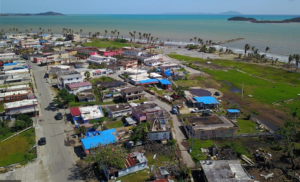 Apropos of which, those of us abroad will be making remittances to help affected family members for years to come. For, just as it was with Puerto Rico, The Bahamas will stop trending as a cause celebre within weeks. That’s when, past being prologue, many governments, charities, and celebrities will turn their attention elsewhere, leaving behind unfulfilled pledges.
Apropos of which, those of us abroad will be making remittances to help affected family members for years to come. For, just as it was with Puerto Rico, The Bahamas will stop trending as a cause celebre within weeks. That’s when, past being prologue, many governments, charities, and celebrities will turn their attention elsewhere, leaving behind unfulfilled pledges.
One need only ask the average Puerto Rican how she’s faring today to appreciate what little impact billions pledged for recovery and rebuilding could have on the average Bahamian. The Puerto Rican government estimated that Maria caused $139 billion in damages, but to date it has only received $13 billion – or less than 10 percent of the billions pledged.
While [Hurricane Dorian] spared Puerto Rico of much damage, it raised attention to how the island is still in recovery mode — and ill-equipped for another natural disaster. …
FEMA provided blue tarps to residents whose roofs had been torn off by the storm, and today, the tarps are still widely visible on the island.
(Mother Jones, August 29, 2019)
But hope springs eternal.
[Update September 16 at 6:50 am: I am no longer accepting donations for Dorian relief. Please donate for that purpose to The Bahamas Red Cross – here.]
Death Toll
Yesterday the Bahamian government raised the official number to 50. But this waiting for whom the bell tolls is beginning to reek of a fetishistic spectacle.
For starters, government officials should spare us their daily warnings about how “staggering” the final toll will be. And the media should stop reporting on this aspect of our national tragedy as if they were previewing a spin-off from The Walking Dead.
That said, it’s only by the grace of God that everyone in my family survived. Because it pains me to share that several friends and neighbors are among the missing and presumed dead.
NOTE: I apologize to my American friends if this commentary detracts in any way from 9/11 commemorations.
Related commentaries:
Dorian…
compassionate poseurs…
Wyclef Jean…
commemorating 9/11…
